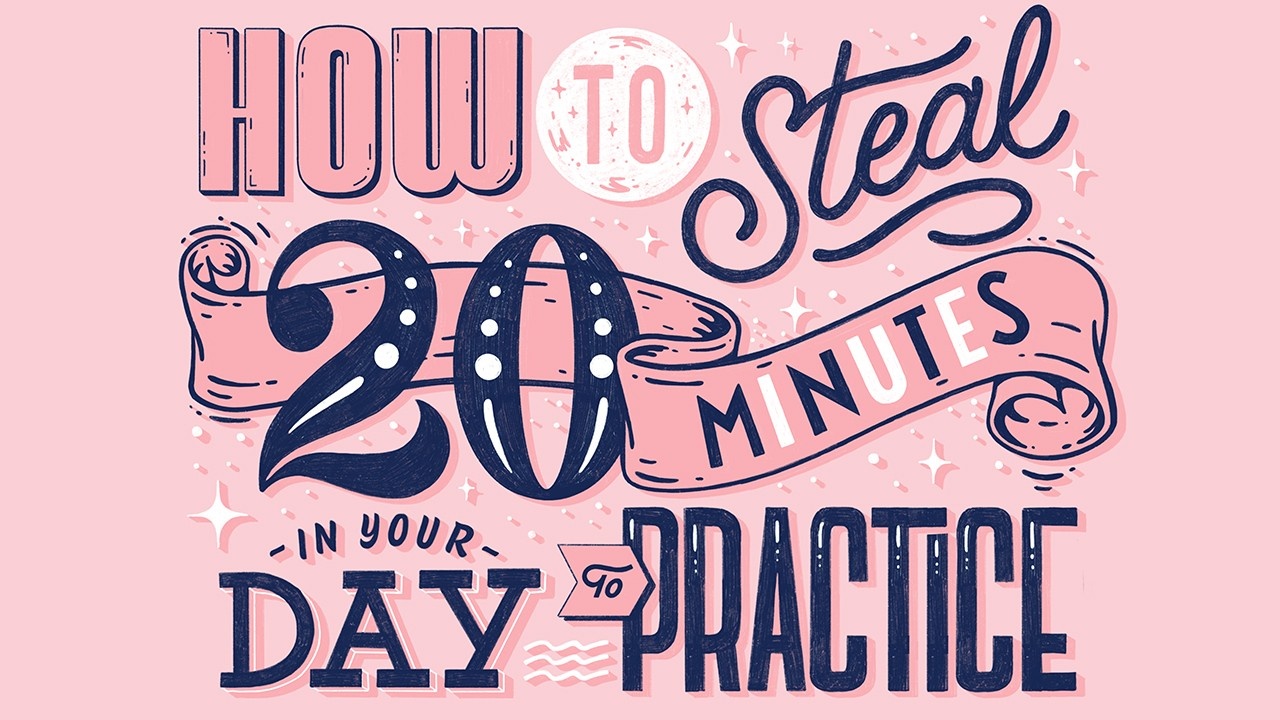How to Steal 20 Minutes in Your Day to Practice
Sep 10, 2019
"How did you get so good at this? I’d love to be able to do this myself, but I don’t have the time and I am not good enough!”
Way too many times I’ve heard people say those exact words to me. Maybe it is true that in order to be the master of a skill, you need 10,000 hours of practice. But do you really need to be a master to enjoy a skill? No. But if you want to get better at anything, you have to start. And sometimes all it takes is a couple of hours per week, so finding the time is not really an excuse. Here’s why.
Time is not really an excuse
We make time for things we value and that matter to us. The busiest people will find time to work on their skills if they really want to, even if it’s only for an hour a day. A week is 168 hours (24 hours multiplied by 7). Let’s say you work for 40 hours a week, that leaves you with 128 hours. If you get 8 hours sleep per night, that means you’ve got 72 hours left per week. That’s about 10 hours per day. 10 hours where you need to find 1 hour to dedicate to your practice. Does it sound doable?
“Lack of direction, not lack of time, is the problem. We all have twenty-four-hour days.” — Zig Ziglar
Just do it
Often times the most difficult part is to get started. If you listen a talented pianist and wish you could play piano the same way, you have to ask yourself: is this really what I want to do? If the answer is yes, then stop wishing and just do it. Find something you are passionate about and make it your goal. Then set yourself a small objective of 20 mins of practice at least three times a week to start with. Often you will see that once you get started you end up practicing for longer. Start small and build momentum from there. Don’t wait until the beginning of a new week and start today!
Don’t be afraid to suck
You can’t be disappointed at the results you didn’t get for the work you didn’t do. Assuming you should be great without doing the work first is nonsense. Everybody was once a beginner. If some people are great right from the start when having a go at something for the very first time, it usually is because they’ve already acquired a similar skill previously, allowing them “not to suck.” Hence why you should never compare your abilities to anyone else. Don’t let the fear of struggling be an obstacle to your practice. Failing at something a few times is an essential part of the learning process. Chances are you’re going to suck and that’s ok. After all, FAIL is really just the First Attempt In Learning.
“If you feel something calling you to dance or write or paint or sing, please refuse to worry about whether you’re good enough. Just do it.” — Glennon Doyle
Stay focused
We live in an age where it is so easy to get distracted. As you were reading this sentence you’ve probably received a text message from your mum, grabbed your phone, replied to the text and then unconsciously started scrolling your Instagram feed and this is how I lose you! Try to find what your biggest distraction is and take all the steps necessary to avoid being interrupted during your practice. My number one tip when practicing is to put my phone on airplane mode. I set a timer and I won’t touch my phone until I am done. Try it, you will be surprised how much more you can achieve!
Practice makes habit
The best way to practice more regularly is to make it a habit. Committing to tracking your practice sessions will help you achieve your skill goals faster. It will help you jumpstart key habits that will drive your productivity. Some people say it takes 21 days of continuous practice to form a new habit. If this is the case, it will take 21 days for you to develop the habit of practicing, helping you do it consistently. I recommend using some king of daily planner or checklist to motivate yourself, be accountable and then develop a habit.
“Baby steps are the royal road to skill.” — Daniel Coyle
Have a plan
Not knowing where to start can be one of the biggest obstacle to your practice. If you want to find the motivation to practice, you need to know exactly what skills and drills you want to work on first. It is important to start with something easy but still challenging and slowly increase the difficulty. Find the right flow, it should be challenging enough to make you progress but still easy enough that you still enjoy working on the skill. Once you know exactly what you want to work on (after doing your research), write everything down.





